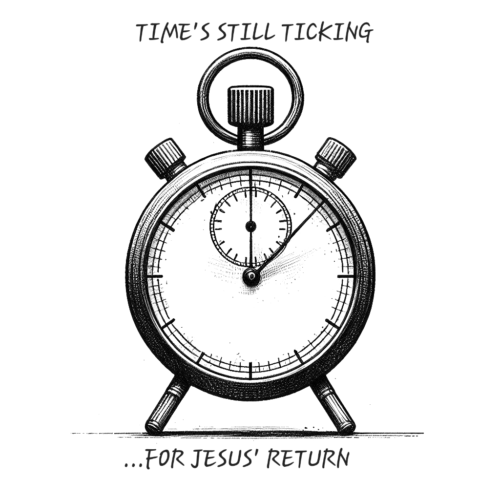The Second Coming of Jesus: Why Hasn’t He Returned Yet?
“Truly, I tell you, this generation will not pass away until all these things take place.” These words of Jesus, spoken nearly 2,000 years ago, have puzzled Christians and provided ammunition for sceptics throughout church history. If Jesus promised to return soon, why are we still waiting?
The question deserves careful attention, not quick dismissal, for it touches on fundamental aspects of biblical interpretation and Christian hope. It’s important to remember God’s plan includes gathering all His elect. Those who’ve come to trust in Him today will be grateful our Lord didn’t return yesterday. This ongoing gathering of believers underscores the patience and mercy of God in delaying His return.
UNDERSTANDING “SOON” IN THE BIBLICAL CONTEXT
Jewish Apocalyptic Language: The New Testament was written within a Jewish theological framework that often used apocalyptic language differently than we do today. The genre frequently employed cosmic imagery and seemingly immediate timeframes to describe both historical and future events. Understanding this context helps us avoid imposing our modern expectations of precise chronology onto ancient Jewish literary forms.
God’s Timeframe vs. Human Timeframe: Peter addresses this very issue when he writes, “But do not overlook this one fact, beloved, that with the Lord one day is as a thousand years, and a thousand years as one day” (2 Peter 3:8). This isn’t merely poetic language but a theological statement about God’s relationship to time. The Lord, who exists outside of time, operates on a different scale than his time-bound creatures.
Biblical Time Language: The Greek terms used for “soon” (tachos) and “near” (engus) in prophecies about Christ’s return carry a range of meanings in addition to simple chronological immediacy. The terms often convey certainty and imminence from God’s sovereign perspective rather than indicating specific timeframes as we understand them. These words are used throughout Scripture to describe events that may be chronologically distant, yet sovereignly certain.
JESUS’ KEY STATEMENTS ABOUT HIS RETURN
The “This Generation” Statement
When Jesus declared “this generation will not pass away until all these things take place” (Matthew 24:34), He was speaking in a complex prophetic discourse that addressed both near and far events. Many Reformed scholars understand this as referring primarily to the destruction of Jerusalem in 70 AD, which that generation did indeed witness. The event served as a type or preview of the final judgement to come.
The Already/Not Yet Framework
Jesus consistently taught the Kingdom of God was both present in His first coming and yet still future in its full manifestation. When He spoke of His return, He often interwove references to both the current and future aspects of His kingdom. The “already/not yet” tension helps explain why some of His prophecies found immediate fulfillment while others await His second coming.
Near and Far Prophecies
Jesus’s Olivet Discourse (Matthew 24-25) contains prophecies about both the fall of Jerusalem and His final return, following a pattern common in biblical prophecy called “prophetic telescoping.” Like looking at mountain peaks from a distance, where near and far peaks can appear to be right next to each other, Jesus’ prophecies often merged near and far events. The destruction of the temple in 70 AD fulfilled the near prophecies, while we still await the final return.
THE REFORMED UNDERSTANDING OF BIBLICAL PROPHECY
On approaching prophecy through the lens of covenant theology, we recognise God’s promises often find multiple fulfilments across redemptive history. Prophecies can thus have both immediate and future applications—in much the same way as David’s kingship foreshadowed Christ’s ultimate reign. We see this pattern throughout Scripture—prophecies often have multiple layers of meaning and fulfillment, creating a rich tapestry of interconnected promises and their accomplishments. The fall of Jerusalem in 70 AD, for instance, serves as both a fulfillment of Jesus’s immediate prophecies and a type of the final judgement.
Just as the Exodus from Egypt foreshadowed Christ’s greater redemption, and the temple prefigured Christ’s body and the church, so too, several prophetic texts have initial fulfilments that point toward greater future realities. This doesn’t mean prophecies have endless possible meanings—rather, later fulfilments align with and expand upon earlier ones, all unified in God’s sovereign plan of redemption.
WHY THE “DELAY” SERVES GOD’S PURPOSES
Far from being a divine oversight, what we perceive as a delay in Christ’s return actually serves crucial purposes in God’s redemptive plan. Each passing year fulfils specific aspects of God’s sovereign design for history and the salvation of His people.
- The Gathering of God’s Elect: What appears as delay to us is actually God’s patient work of gathering His chosen people from every nation, tribe, and tongue. As Peter explains in his second epistle, “The Lord is not slow to fulfil his promise as some count slowness, but is patient toward you, not wishing that any should perish, but that all should reach repentance” (2 Peter 3:9). Each day of “delay” represents God’s merciful patience in bringing His elect to salvation.
- The Fulfillment of the Great Commission: Jesus commanded His followers to make disciples of all nations, and this mission remains ongoing. The gospel has reached more people groups in the last century than in all previous centuries combined, yet there are still unreached peoples who haven’t heard the good news. This worldwide proclamation of the gospel must precede Christ’s return, as He Himself declared in Matthew 24:14.
- Sanctification of the Church Through Waiting: The period of waiting serves to purify and mature Christ’s bride, the Church. This time of anticipation develops our faith, hope, and love in ways that instant gratification never could. The delay teaches us to long for Christ’s appearing while faithfully serving Him in the present.
SIGNS OF HIS COMING: WHAT HASN’T HAPPENED
Christ gave His church specific signs to watch for, helping us understand the times without falling into date-setting speculation. While some of these signs appear to be unfolding in our day, others await fulfillment, giving us both encouragement and continued reason for watchfulness. Here are a few prophecies that await fulfillment:
The Gospel to All Nations
The unprecedented spread of the gospel through modern missions, technology, and translation work has brought us closer than ever to fulfilling Matthew 24:14. Yet there remain people groups without access to Scripture or Christian witness. The acceleration of global missions and Bible translation efforts suggests we may be in the final stages of this sign’s fulfillment.
The Restoration of Israel
The establishment of modern Israel in 1948 and the continuing return of Jewish people to their ancestral homeland has profound prophetic significance. While Reformed theologians debate the exact nature of Israel’s role in end-time events, some see the preservation and restoration of the Jews remains a remarkable fulfillment of Bible prophecy.
The Great Apostasy
Scripture predicts a significant falling away from the faith before Christ’s return. We witness today both unprecedented gospel advancement and unprecedented apostasy in formerly Christian nations. This parallel growth of true faith and apostasy aligns with biblical predictions about the end times.
The Antichrist
While many antichrists have come throughout history, Scripture speaks of a final Antichrist figure who will oppose Christ and His church. The precise nature of this fulfillment remains to be seen, though we observe increasing global capabilities for the kind of worldwide influence and control described in prophetic texts.
CONCLUSION
The apparent “delay” in Christ’s return reveals not divine hesitation but divine wisdom and mercy. Every passing day demonstrates God’s patient love in gathering His people and building His church. As we await Christ’s return, we do so not as disappointed sceptics but as expectant servants, understanding that God’s timing is perfect and His promises are sure. Our role is not to question the timing but to live faithfully in light of the certainty of His coming, proclaiming the gospel and longing for that day when faith becomes sight. As Augustine wisely noted, we live in the tension of the “already and not yet,” confident that the One who promised to return is faithful, and He will surely do it.
THE SECOND COMING OF JESUS—RELATED FAQs
Does Jesus’s delay mean His promises failed? Far from it. God’s promises operate on His eternal timeline, not our limited human schedules. The apparent delay actually demonstrates God’s faithfulness to His covenant promises, as He patiently gathers all His elect, just as He promised to Abraham that his offspring would be as numerous as the stars.
- How should Christians approach date-setting for Christ’s return? Christians should completely avoid setting dates for Christ’s return, as Jesus explicitly stated no one knows the day or hour except the Father. History is littered with failed date-setting attempts that have damaged Christian witness and created unnecessary stumbling blocks for believers and unbelievers alike. Instead, we should live in constant readiness while focusing on our present Kingdom responsibilities.
- What does “watching” for Christ’s return actually mean in practice? Watching involves living with spiritual alertness and Kingdom-minded purposefulness, not anxious speculation about dates and signs. This includes faithful stewardship of our calling, active participation in building Christ’s church, and maintaining an eternal perspective in our daily decisions. Reformed theology emphasises that watching is less about trying to decode current events and more about covenant faithfulness in our generation.
If Jesus could return at any moment, how should this affect our long-term planning? The doctrine of Christ’s return should make us neither passive nor reckless with our earthly responsibilities. Instead, we should plan and work diligently as God’s covenant stewards while holding our plans loosely. This means pursuing education, careers, and family life while remaining ready to lay these down at Christ’s appearing.
- How does Christ’s delay relate to the growth of His Kingdom? The time between Christ’s ascension and return is the period of Kingdom growth Jesus described in His parables of the mustard seed and leaven. Each generation of believers participates in this growth through gospel proclamation and discipleship. This understanding helps us see the delay not as divine hesitation but as time necessary for Kingdom expansion.
- What role should preparation for Christ’s return play in raising children? Christian parents should raise their children with both eternal perspective and present faithfulness. This means teaching them to live productively in this world while maintaining their identity as citizens of Christ’s Kingdom. Reformed theology emphasises training children to understand their place in God’s covenant story, which includes both Christ’s first and second comings.
How can we maintain urgency about Christ’s return without falling into anxiety or apathy? The key lies in understanding our role in God’s covenant story and the “already/not yet” nature of Christ’s Kingdom. We maintain urgency through faithful obedience to Christ’s commands and joyful anticipation of His return, while trusting God’s perfect timing. This balanced approach keeps us from both complacency and unhealthy preoccupation with end-times speculation.
THE SECOND COMING OF JESUS—OUR RELATED POSTS
Editor's Pick

Paul’s Mandate for Men: Headship Or Servant Leadership? Or Both?
Modern Christianity has fallen into a trap. We've created an either/or battle between "headship" and "servant leadership," as if these [...]

Should We Stop Using Male Pronouns for God? Why Do We Say No?
A friend of ours arrived eagerly at his first theology class in seminary. But he quickly discovered something troubling: the [...]

Did Old Testament Law Force Women to Marry their Rapists?
**Editor’s Note: This post is part of our series, ‘Satan’s Lies: Common Deceptions in the Church Today’… Viral misinformation abounds [...]

From Danvers To Nashville: Two Statements, One Biblical Vision
30 years separate the Danvers Statement on Biblical Manhood and Womanhood (1987) and the Nashville Statement on Human Sexuality (2017). [...]

The Nashville Statement: Why Affirm It Despite Media Backlash?
WHY DO REFORMED CHRISTIANS STAND BY THIS STATEMENT ON MARRIAGE AND GENDER? When the Nashville Statement was released in 2017, [...]

Who Is Belial? Solving The 2 Corinthians 6:15 Mystery
Belial: This name from the pages of Scripture chills the soul. Who is this mysterious figure Paul invokes in 2 [...]

Celibacy Or Castration: What Jesus Really Means in Matthew 19:12
One of Scripture's most shocking misinterpretations led theologian Origen to castrate himself in the third century. His tragic mistake? Taking [...]

Philippians 4:13: Did Paul Really Mean We Can Do ALL Things?
"I can do all things through Christ who strengthens me." It's on gym walls, graduation cards, and motivational posters everywhere. [...]

The Ordinary Means of Grace: Why Are They Indispensable?
ORDINARY MEANS FOR EXTRAORDINARY TRANSFORMATION What if God's most powerful work in believers' lives happens through the most ordinary activities? [...]

Is the Bible God’s Word? Or Does It Only Contain God’s Word?
The authority of Scripture stands at the crossroads of modern Christianity. While some argue the Bible merely contains God’s Word [...]
SUPPORT US:
Feel the Holy Spirit's gentle nudge to partner with us?
Donate Online:
Account Name: TRUTHS TO DIE FOR FOUNDATION
Account Number: 10243565459
Bank IFSC: IDFB0043391
Bank Name: IDFC FIRST BANK






